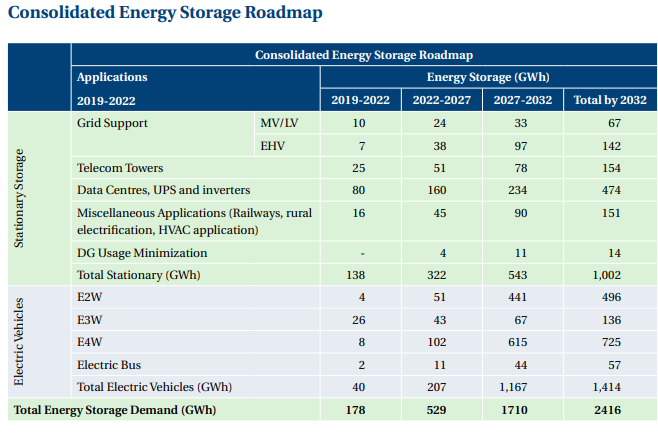Making of a giga-scale battery producing biological system on quick track could solidify India's chance for radical monetary and modern change.
India is likely to require Energy Storage Systems (ESS) of over 2,400 Giga Watt Hour (Gwh) capacity to cater to the needs of all the major sectors of the economy, according to India Smart Grid Forum (ISGF), a public private partnership under the aegis of power ministry.
"The cumulative demand of ESS estimated by 2032 is in excess of 2400 GWh which is a strong case for setting up of giga-scale battery manufacturing plants in India on fast track," ISGF said in a report titled "Energy Storage System Roadmap for India: 2019 – 2032".
 |
| ISGF has prepared an Energy Storage System Roadmap for India in partnership with India Energy Storage Alliance (IESA) and MacArthur Foundation, USA |
The government wants non-fossil fuel based power projects to account for 40 per cent of the total electricity generation capacity by 2030. This requires radical measures to scale up the share of renewable energy. India has embarked on a target of 450 GW of renewable energy capacity by 2030.
The integration of this massive renewable energy capacity is expected to pose challenges for grid operations. Storage projects could play a role in grid integration and management of renewable energy.
According to ISGF, the energy storage market in India witnessed a demand of 23 GWh in 2018 with 56 per cent of the battery demand coming from power backup inverter segment. The electric vehicle industry consumed over 5 GWh of batteries in India in 2018. This is likely to grow to 36 GWh by 2025.
Energy stockpiling could enable the nation to meet its emanation decrease targets and stay away from import reliance for battery packs and cells.
(Source: Assorted with ET Energy on 18th March, 2020)


0 comments:
Post a Comment